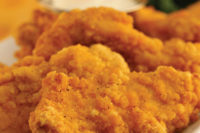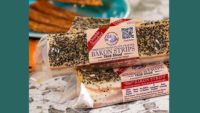Fatty Diet for Focus
October 18/Grand Forks, N.D./The Associated Press -- Running a marathon, grab a carbohydrate bar. Lifting weights, gulp a protein shake. Climbing into a fighter jet? Butter-soaked lobster might help.
That was the surprising finding of a new military-funded study that sought to figure out what types of foods were best for pilots when missions restricted when or what they could eat. University of North Dakota researchers found that pilots who ate the fattiest foods such as butter or gravy had the quickest response times in mental tests and made fewer mistakes when flying in tricky cloud conditions.
High-carb diets trumped high-protein in performance tests.
"We wound up analyzing the data every which way but upside down. It came out consistent every time," said psychology professor Tom Petros, who conducted and reviewed the tests.
Fat has been considered a villain by some nutritionists. Earlier research in humans and animals has linked diets high in saturated fats to mental decline and shorter-term problems with memory and learning.
Athletes and others with physically demanding jobs generally rely on a high-carbohydrate diet for improved performance.
The study's researchers are not saying people should now load up on biscuits and gravy; in fact, researchers said it is hard to draw conclusions from their study because more tests are needed to determine what is behind the results. Follow-up studies begin this spring.
Researchers said the study is not aimed at weight control and noted that because the pilots are young, they are able to absorb a high amount of fatty acids for brain development.
Military experts hope the research will eventually help improve pilots' performance. National Transportation Safety Board statistics show 80% of civil and military accidents are caused by human error.
The study tracked 45 student pilots to assess how different foods affect a pilot's performance. Every three weeks, each pilot spent one week on four different diets: high-fat, high-carbohydrate, high-protein and a control diet.
The menus were similar so the type of diet would not become obvious to participants. In some cases, the difference was in the drinks, condiments, gravy, salad, vegetables and desserts.
"They loved the day they got brownies," said Glenda Lindseth, who helped lead the project. "They all got them, but some of them were a little smaller, and some of them did not have frosting."
One typical meal was thin-crusted extra meat and cheese pizza for the fat diet, a thin-crusted chicken supreme pizza for the carbohydrate diet and a grilled chicken breast with mixed salad greens, fat-free salad dressing and fat-free shredded cheese for the protein diet.
The study used a flight simulator that required students to descend in cloudy weather when the runway wasn't visible and using only the plane's computers. The pilots then had to climb into a holding pattern. They also took tests that required memorizing and repeating numbers and comparing shapes.
"I could tell the difference on how well I was doing on the different diets," said Jeremy Ternes, who participated in the study. "There were times I thought, 'Wow, I was a lot more on today as compared to last week.' "
He added, "I think a lot of people felt they did better when they got the lobster and the good stuff."
Based on their test scores, pilots on the high-fat and high-carb diets performed substantially better than the high-protein eaters.
The high-fat dieters did slightly better than the high-carb dieters.
"With additional research, these findings may help decrease the number of aviation accidents due to pilot error, which is especially important for the war fighter," Lindseth said.
More study is needed to determine whether the findings will have a lasting effect.
"Most of the studies indicate that a diet of saturated fats like those found in junk food reduces cognitive performance," said Fernando Gomez-Pinilla, a physiological science professor at UCLA who was not involved in the study.
"I will be more interested to see what they find when they monitor the composition of the diet."
From the October 26, 2009, Prepared Foods E-dition
Looking for a reprint of this article?
From high-res PDFs to custom plaques, order your copy today!




